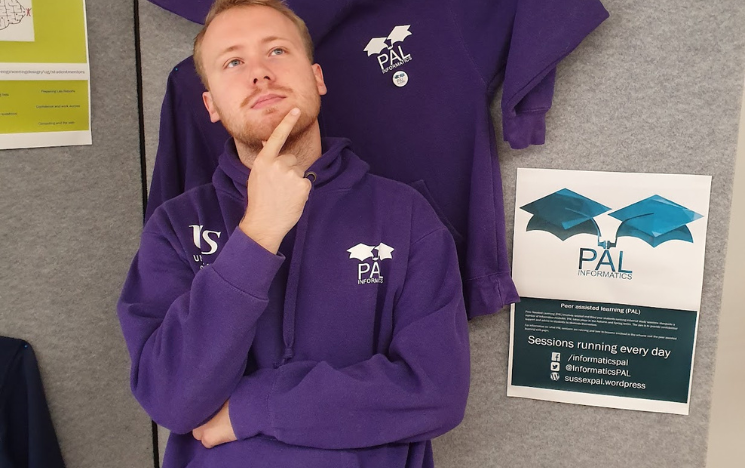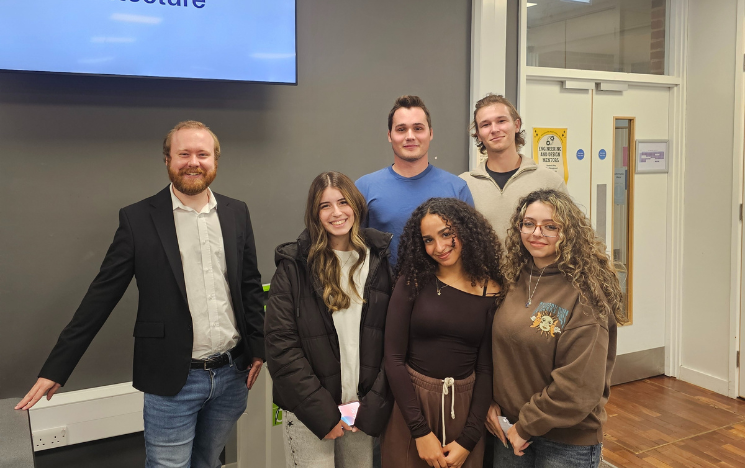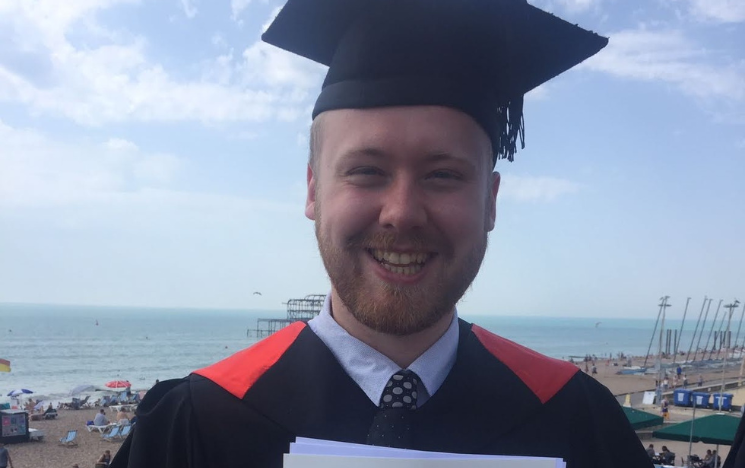Shaun Ring
Shaun Ring (Computer Science 2013) is the Director of LHC Labs, a consulting company that helps organisations transform complex data with custom Artificial Intelligence (AI) solutions.
Shaun’s story
After graduating with a first class degree in Computer Science in 2019, Shaun continued his Sussex journey and is currently studying a PhD in Computer Science, specialising in Natural Language Processing (NLP), specifically text classification. Throughout his degree he engaged fully with in life at Sussex, taking part in the Swing Dance Society, attending hackathons (a hackathon is an event where individuals come together to engage in rapid and collaborative engineering over a short period) and working as a Peer Assisted Learning (PAL) tutor.
In 2025 he launched LHC Labs in order to turn his PhD research into actionable AI solutions.
What made you choose Sussex and the undergraduate course you studied?
I originally started as an undergraduate student in Astrophysics. Through that course, I was introduced to programming, and it completely captured my interest and imagination. I loved how much could be built and explored with code and data science. I decided to switch courses and haven’t looked back since.
What made you want to start your new business, LHC Labs?
I’ve always been interested in how technology moves from research to real-world application. While working on AI projects at the University of Sussex, our team realised that many of the insights we were generating could have a much wider benefit, but there wasn’t a structure to make that happen.
For the past six years, while working part-time on my PhD, I’ve also been working in industry to develop research that applies directly to real data and scenarios, mostly focused on analysing social media insights. That combination of academic depth and hands-on experience really shaped how I see the potential of AI.
Starting LHC Labs was a way to bring those two worlds together, combining the creativity and rigour of research with the agility and practicality of industry. It’s exciting to build tools and generate insights that help people in meaningful, impactful ways, grounded in both research and real-world experience.
It’s about helping organisations learn about AI, harness its power, and create real-world impact.” SHAUN RING
Computer Science
What are some of the ways that LHC Labs will be able to help businesses utilise AI?
At LHC Labs, we help businesses use AI intentionally, making it genuinely useful rather than overwhelming, through three main areas:
- Firstly, we turn complex or unstructured data, such as social media conversations or large text collections, into clear, actionable insights that support smarter decision-making. This includes understanding online narratives, detecting trends, and evaluating the impact of statements or events.
- Secondly, we build custom AI tools and workflows, like data pipelines or Retrieval-Augmented Generation systems, that let organisations query their own data and get reliable, evidence-based answers.
- Finally, we focus on learning, creating accessible guides, workshops, and training that help teams build confidence and apply AI effectively in their own work.
Altogether, it’s about helping organisations learn about AI, harness its power, and create real-world impact.
What have you found most surprising since starting LHC Labs?
The way people use AI has been the biggest surprise. There’s a divide between those who don’t trust it at all and those who use it for everything, often without safeguards. AI is an incredible tool, but it’s not the right solution for every problem.
We’ve found it works best when there’s a clear goal and understanding of how to use it safely, something we emphasise throughout our training. And sometimes, a simple script is still the cheaper and more reliable option! Helping organisations find that balance has become one of our key focuses.
During your time at Sussex you were a PAL (Peer Assisted Learning) tutor, going on to run the programme and win a University of Sussex Education Award. Can you explain how the programme works and why you think it’s important?
PAL is very close to my heart. When I started, it was a six-person team and by the time I left it had grown to 18, running workshops and events for the Informatics department.
In simple terms, PAL is there to help. We select high-performing students to support others who are struggling, explaining concepts from a student’s perspective. Sometimes, all it takes is someone friendly explaining things at their own pace to help a student reach a breakthrough.
Because PAL operates independently from teaching staff, we could be more flexible – using platforms like Discord, which proved invaluable during COVID. PAL also supports students beyond academics, providing a first point of contact for anyone unsure where to turn. My favourite part was always seeing that “lightbulb moment” when something finally clicked – that, and a lot of whiteboard scribbling!

You are currently completing your PhD part time at Sussex. What does your research focus on?
My research focuses on text classification using NLP and AI, mainly around identifying different types of unhealthy language online. I started working on this before generative AI became widespread, so it’s been interesting adapting to those changes and exploring how to best use new models for this purpose. The project looks at both the challenges of the problem and the technology behind solving it.
Favourite place in Brighton?
Hove, actually.
What advice would you give to any students looking to start a business?
Make the most of every opportunity at the university. The network you can build here is incredibly valuable, no matter where you go next. You’ll find some of the most interesting people to collaborate and share ideas with right on campus, so talk to them, get involved, and explore what’s possible.

Shaun (far left) stood with five students from a University of Sussex lab for whom he worked as a Doctoral Tutor
Shaun is among thousands of inspiring alumni on Sussex Connect. Join now to seek mentoring and industry advice and get a head start on your career.
